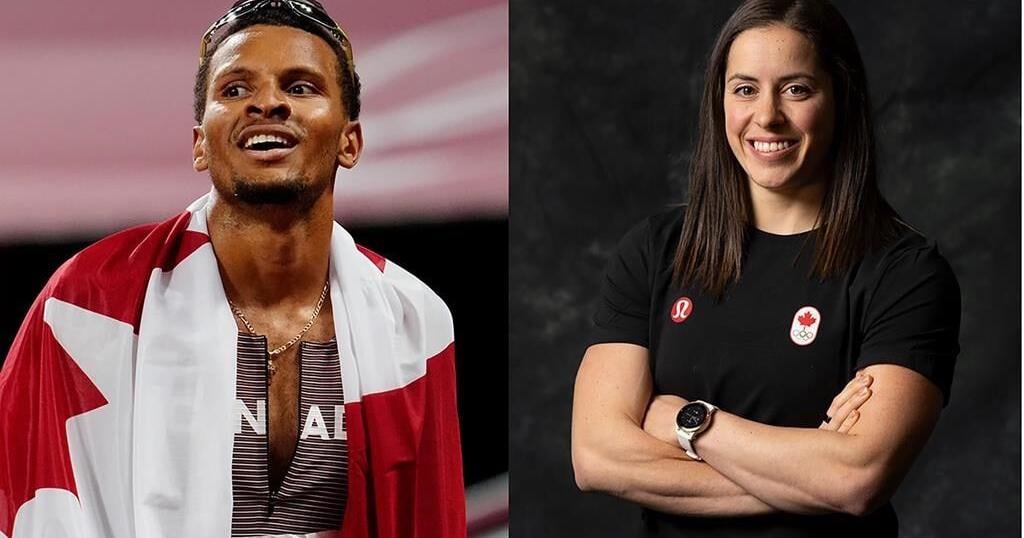PARIS – Decorated sprinter Andre De Grasse and weightlifting champion Maude Charron couldn’t resist the chance to carry Canada’s flag into such a unique opening ceremonies of an Olympic Games.
De Grasse of Markham, Ont., and Charron of Rimouski, Que., will bear the Maple Leaf on a boat on the River Seine in Paris on Friday, instead of leading Canada in the traditional athlete parade into a host city stadium.
“It’s wild. It’s crazy,” De Grasse said.
De Grasse of Markham, Ont., won gold in the men’s 200 metres in Tokyo three years ago and owns six Olympic medals to make him Canada’s most decorated man in Summer Olympic Games history.
Charron of Rimouski, Que., captured weightlifting gold in the women’s 64-kilogram division in Tokyo.
The Canadian Olympic Committee announced its flag-bearer selections Wednesday, although both athletes had known for a few days. They had to keep it secret from all but their inner circle.
“I feel like saying thank you is not enough,” Charron said. “From all of the great athletes we have, they only pick two. It’s just crazy.
“Everybody should be able to hold the flag for a second. Everybody has a story to tell. I’ll do my best, as always, to represent the country that helped me so much to become the person that I am today. With De Grasse, it’s just going to be amazing. He’s a legend.”
De Grasse will compete in his third Olympic Games and Charron her second, but both will participate in their first opening ceremonies Friday at 7:30 p.m. local time (1:30 p.m. ET).
“It’s going to just motivate me,” said De Grasse. “It’s going to give me that extra boost that I need to go out there and make my country proud.
“Going to my third Olympic Games, having this opportunity I probably never thought I’d have, it’s a dream come true for me.”
De Grasse, 29, and Charron, 31, compete later in the Olympic Games. The preliminary round of the men’s 100 metres is Aug. 3 and Charron lifts Aug. 8.
Both athletes adjusted their preparation plans to participate in the ceremonies, in which almost 100 boats will ferry an estimated 10,500 athletes from more than 200 countries on a six-kilometre stretch of the Seine to an area across from the Eiffel Tower, where the Olympic cauldron will be lit.
De Grasse and Charron will return to their pre-Olympic training bases in Rome and Nice, France respectively after the opening ceremonies.
“The flag-bearer took it over the top,” De Grasse said. “I said ‘OK I get a chance to do it.’ You never know. This could be my last (Olympics).
“I do want to try to do one more in L.A. To get the opportunity to do it now, I was like ‘why not? let’s do it.'”
About 100 of Canada’s 316 athletes — there are also 22 alternates — will ride the boat Friday.
Some will want to conserve energy if their events are Saturday and others compete in the back half of the schedule and haven’t arrived in Paris yet.
“I really understand why people don’t do the opening ceremonies and that’s why I didn’t do the one in Tokyo,” Charron said. “With the boat version, we don’t have to walk, we don’t have to be standing and it’s Paris.
“It’s even more than what I expected from my Paris experience. I’m not just doing the opening ceremonies. I’m leading the team. I cannot believe it. I still have goosebumps saying that.”
Miranda Ayim, a three-time Olympian in women’s basketball, and men’s rugby sevens co-captain Nathan Hirayama carried Canada’s flag in the opening ceremonies in Tokyo, where the Summer Games were held amid a state of emergency because of the COVID-19 pandemic.
Two-time Olympic trampoline champion Rosie MacLennan, who is in Paris as part of the COC’s mission staff, was Canada’s flag-bearer in 2016.
Preliminary competition in Paris got underway Wednesday with men’s soccer and rugby sevens. Canada gets started Thursday with archery and women’s soccer.
This report by The Canadian Press was first published July 24, 2024.
